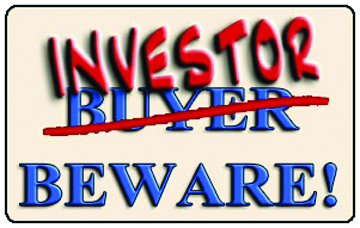By Jerry Love & Wayne Taylor, LBF Communications
ALEXANDRIA – Investment consultant and financial author Charles Ellis is attributed with saying, “Las Vegas is busy every day, so we know that not everyone is rational.”
Oftentimes in the course of our lives we receive “good news” or we are presented with an opportunity that elicits the response “That’s just too good to be true!”
All of these “too good to be true” moments can be initially exciting. However there are times when these moments occur around the presentation of investment opportunities. At these times our antennae should be up, radar tuned in and a healthy dose of “rational” close at hand.
There is a fundamental principle in the world of finance regarding risk and return: The greater the potential return, the greater the risk. If a salesperson offers a product that purportedly is going to bear a higher than normal return, you have to find out what the risks are.
If the salesperson claims this high yielding investment has “no risk” or that the investment is “guaranteed,” slowly back away from that “opportunity.” Either the salesperson does not understand the risk themselves or they are being dishonest.
This type of situation merits a special word of caution to pastors and church leaders: Any sales-oriented job is built on establishing relationships. There are many trusted advisors who are plugged into their local churches, participating in Bible study classes and other aspects of church life and are wonderful servants of the Lord. However there are some in the investment arena who will target churches or church groups to build a client base.
A great amount of discernment should be used when allowing any sales personnel access to church members. The church or pastor should not put themselves in the position of tacitly endorsing a person or product without fully understanding the circumstances.
Let’s walk through some basic thoughts to consider before handing over money to an investment advisor.
WHO IS THE GUARANTOR?
When a guarantee is offered or implied you must find out who is providing that guarantee. There is a major difference between the guarantee of a low rated insurance company and the guarantee of the federal government. Keep in mind that insurance companies, banks, and investment firms can fail. Lehman Brothers, Washington Mutual Bank come to mind in recent years; the FSLIC crisis in the 80’s is another reminder.
Also find out “what” is being guaranteed. A recent TV advertisement was hawking a gold coin as “Government Guaranteed”. As it turns out the value of the coin was not guaranteed; only the weight of the coin was guaranteed by the mint of a foreign government that struck the coin for this private coin seller.
ALWAYS, THERE IS RISK
A quick internet search shows at least 9 different types of investment risk. The types of risk can range from how quickly or easily I can get my money back to the solvency of the institution backing the investment. Most sales pitches that include the phrase “no risk” are referring to fluctuations in the market value only. Risk can be mitigated or reduced somewhat but never eliminated.
FRAUD IS A POSSIBILITY
This one is a tough one. I remember an investment opportunity involving timber contracts a number of years ago that turned out to be a Ponzi scheme.
Quite a few people were able to invest and make a higher than normal return. Unfortunately many, many others lost a sizeable portion or even all of their invested money when the scheme fell apart. Even worse, most of the sales staff members recruited by the perpetrators were reputable individuals who became victims as well. There are far too many situations like this that occur including, unfortunately, one involving the Arizona Baptist Foundation in the late ‘90’s.
So what’s an investor to do?
DO YOUR HOMEWORK
Find reputable advisors representing reputable firms. Talk to friends and co-workers regarding their choice for advisors.
If possible, observe the conduct of the advisor in various public and private settings. Be certain to check with licensing and regulatory authorities to discover any complaints or problems.
Do as much research as you can on the product being offered and don’t hesitate to get a second opinion from another advisor.
SET RISK BOUNDARIES
Find reputable advisors representing reputable firms. Talk to friends and co-workers regarding their choice for advisors. If possible, observe the conduct of the advisor in various public and private settings. Be certain to check with licensing and regulatory authorities to discover any complaints or problems. Do as much research as you can on the product being offered and don’t hesitate to get a second opinion from another advisor.
DON’T BLINDLY INVEST
Ask questions and get the details on fees, guarantees or any area of concern.
A number of investment products come to mind that can be appear simple on the surface but can be complex: viaticals, equity indexed annuities, deferred annuities, real estate investment trusts (REITs), master limited partnerships – all MAY provide above normal returns but each have pitfalls. All of these have complexities that the average investor may not fully comprehend.
God clearly calls us to be wise stewards of the assets he places in our hands and investing can be a healthy part of stewardship. There are times when our investments can provide a positive “too good to be true” moment. Just remember, in the world of investments if it looks “too good to be true,” it usually is!
The Louisiana Baptist Foundation was established in 1944 as agency of the Louisiana Baptist Convention to assist with stewardship through gifts supporting Baptist ministry.




